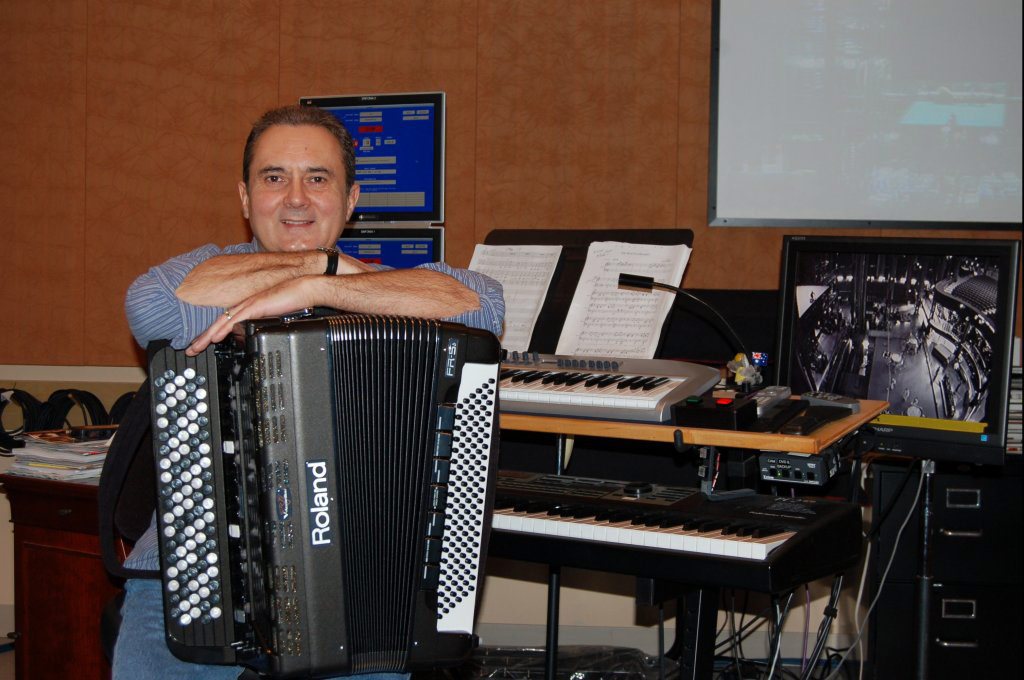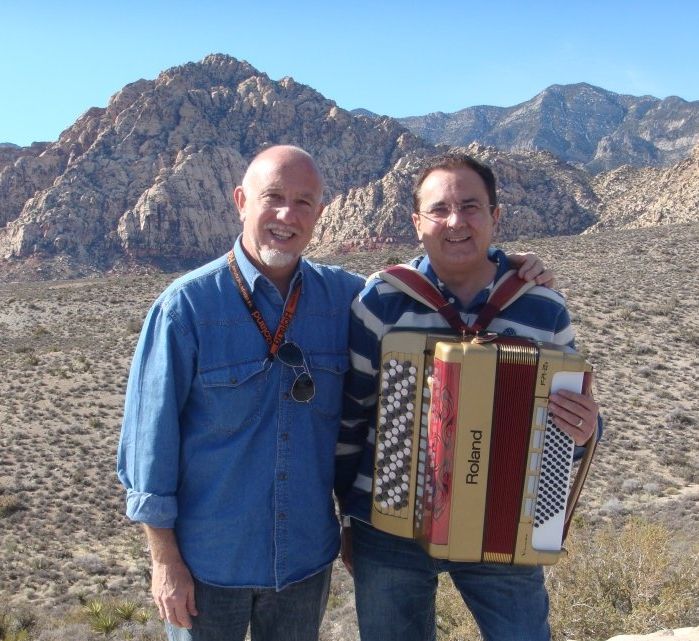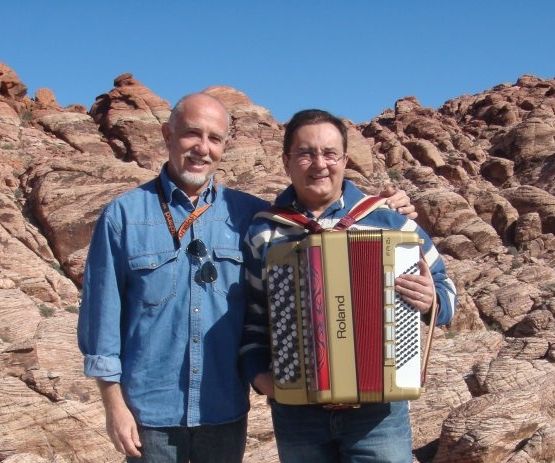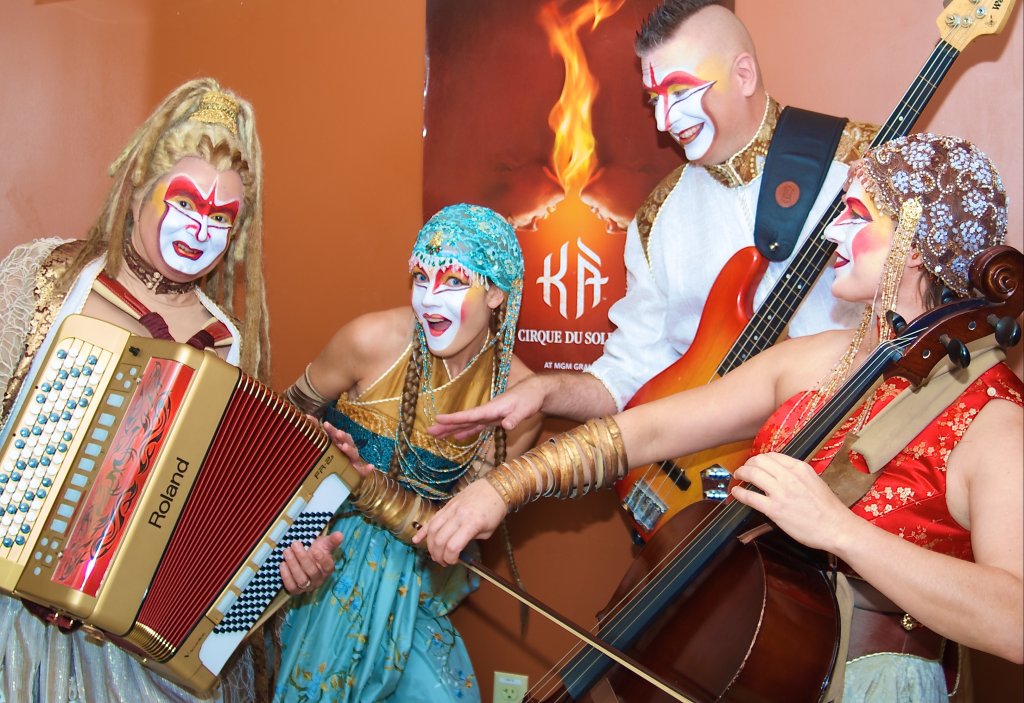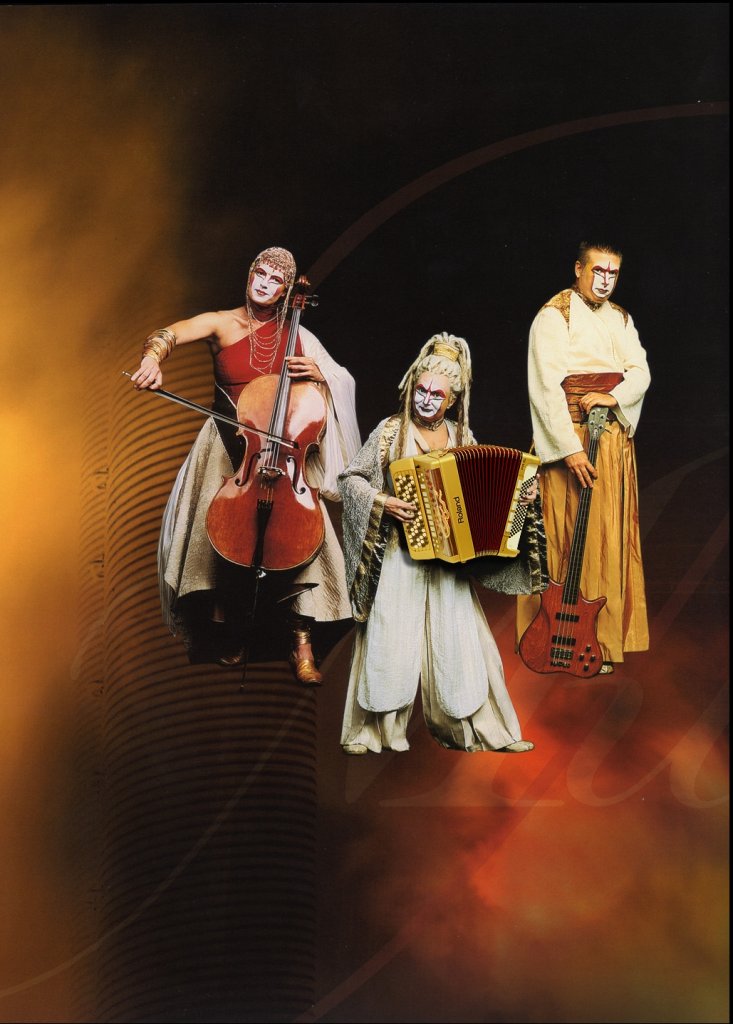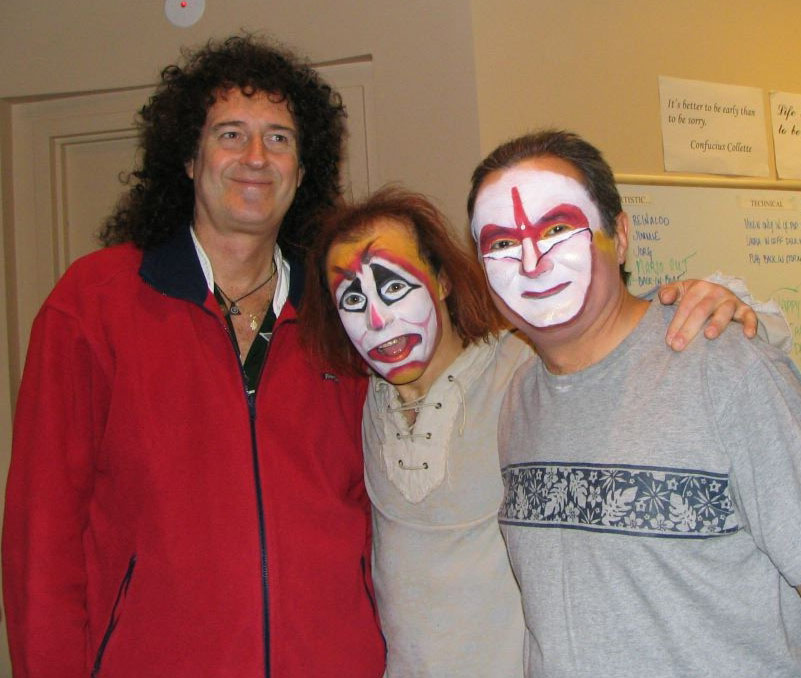Celebrity Interview of Hubert Gall, accordionist for the "KA" show Cirque du Soleil Las Vegas. After the last NAMM show in Los Angeles, Luigi Bruti, marketing director of Roland Europe met Hubert Gall, the accordion player working at Cirque du Soleil "KA" in Las Vegas. A special cabinet colour version of V-Accordion FR-2 has been created for his stage performance at Cirque du Soleil and Luigi Bruti flew there for this premiere. Holda Paoletti-Kampl, Accordions Worldwide Europe Manager, had an interview by phone with Hubert and Luigi during their stay in Las Vegas.
Q: Where were you born? A: I was born in Strasbourg Alsace in July 1957. Q: When did you start learning the accordion? A: I started when I was 9. My parents liked listening to me and I was naturally seduced by the sound and the expressive possibilities of the accordion. Q: Who was your teacher? A: I was very lucky to have Georges Bocchetti as my teacher, an incredible Italian accordionist. He played the accordion as well as anyone at that time, a merge between Art Van Damme and the Richard Galliano musical genre. He devoted himself to teaching and he doesn't appear in public. I remember that during some lessons he said to me: "today I play and you listen..." What a formidable experience! I had the impression of listening to a big band. I had this wonderful opportunity to develop my ear with an accordion music style, different from anything that was played at that time.
Q: Have you never participated in any accordion contest? A: I won the cup of Europe in Bonn in Germany and twice, I won international accordion competitions in Spa, Belgium in 1972 and 1973. Q: Besides the accordion, have you had any other musical educations? A: I was a student at the "Conservatoire National de Strasbourg". As the accordion was not accepted, I learned the acoustic bass. Q: What was your first performance in public? A: At 11 years old, my parents and my teacher had me play in several festivitals and cultural events in Alsace. Then from the age of 16 years, I started to integrate myself in small dance orchestras. Q: What kind of music did you play? A: I played the only kind of accordion music that the audiences listened too then, which in Alsace, was the French musette and German folk music. These genres were not so attractive to me and the audience was not ready to listen to a different type of accordion music. The majority of contemporary music (jazz, Rock, Fusion, Pop) were experiments using new electronic instruments. That music addressed new sounds and tradition was forgotten. The accordion seemed to have no place in this new music scene.
Q: Did you continue to play? A: We must remember, that for most accordion players of my generation, the seventies and eighties were dark years for the accordion. Not accepted by conservatives and concert halls, and rejected from most other types of musical performance. If you did not play the musette, the accordion in France had virtually no outlet. I was therefore directed towards the electronic organs and keyboards that I learned using my considerable musical education. In that period I moved to Paris and I started to work as agent in the commercial distribution of electronic musical instruments. I played keyboards in the weekend for private weddings too. I was also a singer and I did not play the accordion for quite a while. Q: When did you become a professional musician? A: In my middle 30's, I said to myself: "I always wanted to be a musician, now or never." I left my job and I dedicated myself completely to the music. Q: What was your business? A: For over 10 years I played keyboards - in the piano bar, in recording studio sessions, a television appearance as an accompanist, cruises, dance music ... I have also accompanied the singer Demis Roussos. I rarely played the accordion. I was a musician looking for gigs. Q: How did you reach Las Vegas? A: It was an encounter with a violinist of Quebec, who will later become my woman. She worked several years for the performance of Mystère Cirque du Soleil in Las Vegas. To be with her, I left everything in France, except a suitcase and my accordion. Q: Did you then return to the accordion? A: I would rather say, that the accordion has come back to me. Upon my arrival in the United States I did not have permission to work. So every day, I practised at home with the accordion. At that time, there was a real revelation, a return to origins. This is the instrument I love, I'm an accordionist and this will not change anymore. I sent a demo CD to Cirque du Soleil, and they invited me for a hearing. They had a new show of the circus under construction in Las Vegas. It was a big show with a production cost of over US$200 million dollars. Ruberto Lepage, the director, who has worked with Peter Gabriel and Mark Fisher, creators of the shows of the Rolling Stones and U2, were about to create a show using the new techniques in live shows: revolving scenes, special effects, video effects, sound in 5D, martial arts, etc... It is like the theatrical version of a fantastic film. The composer René Dupéré wrote a genre of soundtrack music with the accordion. I had an audition specifically for this show and I was hired.
Q: Tell us a little more about this show? A: The name of the show is "KA". The show is held at the MGM Grand in Las Vegas, and we play 2 times a day, 5 days a week. The contract with the casino is for 10 years and it has been going on for 4 years. To run the show takes 75 artists (acrobats, musicians, actors) and 150 technicians. We are 8 musicians: 2 keyboard, bass, drums, guitar, cello, accordion players and a singer. The symphony orchestras sections were sampled. The public does not see the musicians. We play inside the studio located 2 floors below the stage and we follow the show on a video screen, and as well, I appear twice on the stage. Q: What kind of accordion do you use? A: At first I used a 4 treble reed (voices) accordion in the studio and a smaller 3 treble reed (voices) on the stage. Then the "art direction" asked me to play some parts of the keyboard. I decided to play them through the MIDI of the accordion. I have therefore searched for an instrument which could reproduce acoustic sounds without problem of tunings (the weather conditions are extreme in Nevada and the desert helps to make more complicated the work of the tuners) for accordionists. Moreover, I needed a MIDI controller performance and free bass section to play the keyboard parts. My interest was naturally focused towards the V-Accordion FR-7 Roland, to meet these requirements.
Q: How was the transition from the digital acoustic accordion? A: I'd like to tell a small anecdote. I went to the NAMM show in Los Angeles to try the instrument, but since I did not have an official badge, I could not enter. Outside the building, in the crowd, I coincidentally recognized Luigi Bruti of Roland. We did not know each other, but I had seen his demo video with the V-Accordion on YouTube.com. I introduced myself, and he kindly invited me to enter with him. At the Roland display, I tried the FR-7, and in 5 minutes I was conquered and convinced. I bought the instrument on the spot. After that, I spent 3 months of adapting my performance to suit the Roland FR-7 and programing the instrument for my work. I then started to use the V-Accordion FR-7 in the show. I was very satisfied with its sound, the way it worked with the sound system and other instruments, and the human interface of the FR-7. Q: Have you abandoned your acoustic accordion? A: No, I will continue to play acoustic instruments. The acoustic and digital accordions are quite complementary. Look what's happening on the piano. Thanks to the digital, I now use the piano in places where its performance had gone. And what about all the new students that digital has brought to music learning, with its lower price, easy transport and maintenance The same thing is happening for the accordion. Thanks to digital, you will see more and more the accordion in new contexts. You can already hear the accordion in Madonna and Paul McCartney's concerts. For me, for the highly professional show that I am engaged in, I found, the FR-7 the perfect instrument: many very different sounds of accordion reeds in one instrument, no need to be tuned every 3 months, a MIDI controller with very high performance, free bass without extra weight, easy amplification and connection to the highly sophisticated sound system of our show with none of the disadvantages of accordion reed microphones such as feed back, difficulty in achieving excellent sound quality for both bass and treble. I am now using the Roland FR-2 for the stage part of my performance. Roland even built a model with a color that blends with my costume on stage. I worked on the possibility to play on the stage with this accordion, with the sound modules located 2 floors lower than the stage to which I am connected by a wireless MIDI controller. The Roland instrument met these complex professional performance requirements without problem.
Q: Do you have other projects? A: Now, I am very happy to contribute to the promotion of the instrument that I play. I play every night in front of about 4,000 people who do not come especially to listen to an accordion recital. What is important, is that my accordion will mix with the other instruments and sound effects forms of entertainment. In the future, I plan to continue communicating with the Roland offering my professional experience from using the V-Accordion, to suggest ideas for future models. I am planning in the future, to write my songs, play and record them with other musicians and make a CD with popular appeal that features the accordion in modern genre. Editor: You can read more about the manufacturing of the Roland accordions A Roland is Born in Italy |

